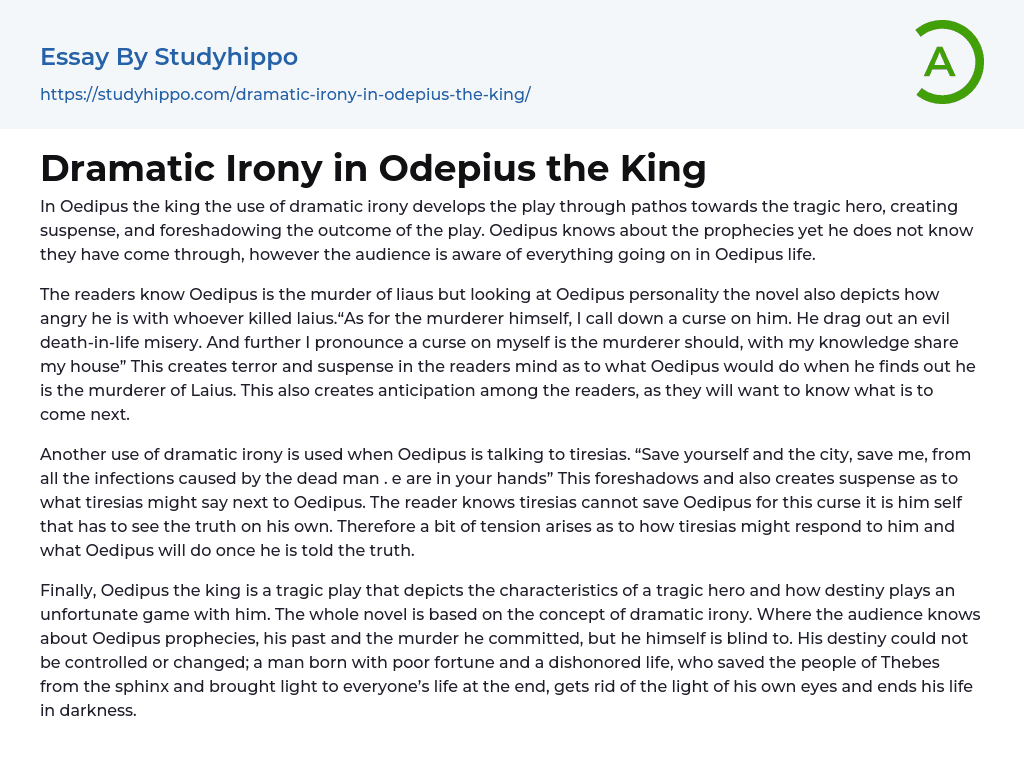The utilization of dramatic irony in Oedipus the king serves to progress the play by invoking feelings of pity towards the tragic hero, generating suspense, and hinting at the forthcoming events within the play.
Despite Oedipus' awareness of the prophecies, he remains ignorant of their fulfillment. However, as readers, we are aware of all the details of Oedipus' life. We know that Oedipus is the one who killed Laius. The novel also shows us how Oedipus expresses his anger towards the unknown murderer: "As for the murderer himself, I curse him. He will suffer a miserable existence resembling death. Furthermore, I curse myself if I were to welcome the killer into my house knowingly." This creates fear and suspense in readers as they anticipate how Oedipus will react when he eventually discovers his own guilt. It also builds anticipation among readers
...who eagerly await what will happen next. Another example of dramatic irony occurs during Oedipus's conversation with Tiresias.
"Save yourself and the city, save me, from all the infections caused by the dead man. We are in your hands." This creates foreshadowing and suspense regarding Tiresias' next words to Oedipus. The reader understands that Tiresias cannot save Oedipus from this curse; Oedipus must discover the truth himself. Therefore, there is tension around how Tiresias will respond and what Oedipus will do once he learns the truth. Ultimately, Oedipus the king is a tragic play that portrays the characteristics of a tragic hero and the unfortunate game destiny plays with him.
The central theme of the novel revolves around dramatic irony – the audience possesses knowledge of Oedipus' prophecies, his past, and the murder he committed, while
he remains ignorant. His fate remains immutable; he is born into a life of misfortune and dishonor. He manages to free the people of Thebes from the sphinx, illuminating their lives, yet tragically blinds himself and ultimately meets his demise in darkness.
- Educating Rita essays
- Book Summary essays
- Metaphor essays
- Reader essays
- Rhyme essays
- Literary devices essays
- Villain essays
- Books essays
- Genre essays
- Literary Criticism essays
- Writer essays
- Protagonist essays
- Simile essays
- Poem essays
- Book Report essays
- Book Review essays
- Greek Mythology essays
- Plot essays
- Tragic Hero essays
- Coming of Age essays
- Play essays
- Rhetoric essays
- Rhetorical Question essays
- Translation essays
- Understanding essays
- Reason essays
- Character essays
- Letter essays
- American Literature essays
- Literature Review essays
- Utopia essays
- Poetry Analysis essays
- Dante's Inferno essays
- Between The World and Me essays
- Incidents in The Life of a Slave Girl essays
- Flowers for Algernon essays
- Myth essays
- Everyday Use essays
- Boo Radley essays
- Genesis essays
- Richard iii essays
- Alice in Wonderland essays
- On the road essays
- Ozymandias essays
- The Nightingale essays
- Holden Caulfield essays
- Animal Farm essays
- 1984 essays
- A Hanging essays
- Shooting An Elephant essays




